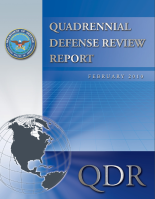The Pentagon is forever reviewing everything — from lead-free bullets (a more environmentally-friendly way of killing) to improving chow for America’s ever-expanding Army (on a per-capita BMI scale, of course). But the biggie – for the past generation of Pentagon denizens – has been the QDR, or Quadrennial Defense Review. It’s the once-every-four-years exercise that drills deep into what the military does, and why – and leads to setting requirements for the people and weapons needed to carry out that resulting strategy.
The Pentagon finished its most recent QDR in February 2010. Unfortunately, President Obama threw it out last week when he announced he and Defense Secretary Robert Gates will “conduct a fundamental review of America’s missions, capabilities, and our role in a changing world.” He needs to do that to cut another $400 billion out of military spending between now and 2023. No way to do that by trimming a little here, and a little there. It will require whacking some major service roles and military missions. That’s why the Pentagon is so nervous following Obama’s speech. One military-industrial complex blog warns: Pentagon Getting Rolled Again. A second warns that The mother of all reviews is headed for the E-ring.
Back in 2009 – before he left Congress to become governor of Hawaii – Rep. Neil Abercrombie struck me as an average Joe who ended up on the House Armed Services Committee because defense dollars meant a lot to his island paradise. But lo and behold – after nearly 20 years on Capitol Hill — he ended up running the HASC’s air and land forces subcommittee. As the latest QDR was heating up at the time, I asked him about the QDR’s validity and reliability for charting U.S. national-security policy.
“I don’t think it’s valuable and I don’t think it’s reliable,” Abercrombie answered. He recalled the first QDR he read shortly after coming to Congress in 1991. “I looked at it and I thought this is a PR stunt — `Over the horizon’ or whatever, `Morning In America,’ I don’t know — the Defense Department version of `Morning In America.’ Except it was generals of four star [rank] staring into the middle-distance reverently,” he said. “Really, I’m not being facetious here…that’s what it was. It was nothing. It’s all rhetorical flourishes and `Here we go.’ It’s all Thunderbird stuff, booms, and all that.” No wonder he left Washington.
The whole QDR exercise has long been little more than a rubber stamp to continue business as usual, just like its younger sibling, the occasional Nuclear Posture Review (not to mention the Ballistic Missile Defense Review and the Quadrennial Review of Military Compensation (Volumes 1 and 2). Generally, these exercises are the ultimate in self-licking ice cream cones, because the only preachers involved used to be members of the choir.



